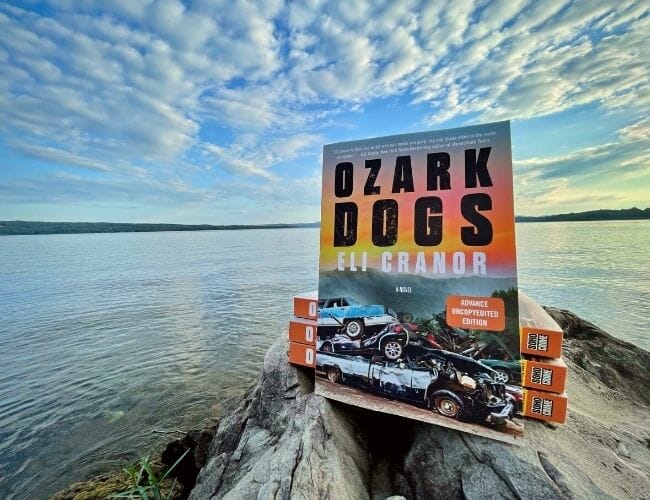

Uh oh...
It appears that you're using a severely outdated version of Safari on Windows. Many features won't work correctly, and functionality can't be guaranteed. Please try viewing this website in Edge, Mozilla, Chrome, or another modern browser. Sorry for any inconvenience this may have caused!
Read More about this safari issue.

There is something about Arkansas and football. Stories of the game are woven into the very fabric of our state. This story starts like a regular, All-American football in the South story. There are twists, turns and a bit of mystery. However, that is not the plot of the upcoming novel by Arkansan Eli Cranor; that is the story of his life so far. And we are intrigued by the stories he has told and the ones on down the field.
Eli Cranor is the son of public school teachers, a Russellville High School standout athlete and an All-American kid. He turned down the ideal football recruitment package to answer the what-ifs at a college closer to the beach. But it was short-lived. After one year of playing with sand in his toes and beach waves after practice, his heart was still tethered closer to home.
Cranor ate crow and called his recruiter to see if the offer might still be on the table. And it was. That coaching relationship turned into a friendship and a bond of mentoring, discipleship, and something much bigger than what happened on the gridiron.
With a highly anticipated novel releasing this week, we sat down with Eli Cranor, standout athlete turned football coach, English teacher and novelist, to hear more of this gripping story.

Q&A with Eli Cranor:
Let’s start with the obvious, where did you find interest in writing a book?
My parents were both public school teachers. In the summers, my dad made me keep a summer reading journal. I hated it, always getting frustrated, claiming, “This was the worst day ever.” But, just like sports, with practice, I got good at reading…and writing. So, I kept practicing.
How does a guy like you go from quarterback to author?
The easy answer is…I just kept writing. But it was not that easy. I did play college football and in an overseas league after graduation. Then, I returned to Arkansas to join my mentor, JR Eldridge, as his assistant coach. And then, a few years later, I got a head coaching job. That is the ultimate dream as a coach; you want to be at the helm. But it was a lot. I was 26, and we were not winning. I had a baby at home, and I was feeling the pressure, and yet I looked at the guys I was coaching and thought their lives were complicated beyond what I was dealing with in the locker room.
So, I stepped back. I moved closer to my hometown, into the English classroom and stayed in that space with my students. But I never quit writing all along, any chance I got – between meetings, on the school bus, during my planning period, and during lunch break.
In some ways, it was always there. In other ways, I just had to keep working at it.

In 2022, you released your debut novel, “Don’t Know Tough.” Where did you develop your plot and characters?
This is always everyone’s first question. They want to know if this story is based on a real town, real people or real events. And my first answer is “Yes, but.” The stories of these characters and this rural town in Arkansas are real, but they are not based on any one place. I thought about the guys I met on my teams, where they lived, and the real issues their families faced. I could relate to the coach in the story, where you sometimes feel the weight of being a mayor, sheriff, and youth pastor all in one role.
When I wrote the line, “I still the feel the burn on my neck, told the coach it was a ringworm, but it ain’t,” I knew I had something. But what was published was my fifth edition. I wrote this story in 2017, which wasn’t released until 2022. It was rejected over 200 times, but I knew I had something, and I was not willing to give up.
Does Arkansas play a significant role in your novel?
An old phrase in writing is “Write what you know.” If that were always true, we would have a lot more boring books, but for me, setting my book in Arkansas was what I know and wanted to offer – the good, the bad and the ugly. I wanted to tell the real story of some sections of Arkansas that do not always get a voice.
The stories are painful, but so are the statistics. I was not holding anything back. I try to do my best to share an honest look at the lives of these athletes and their families. I expose a different view of poverty in Arkansas, even using a unique “hill country” vernacular of the main character as a voice throughout the book. I wanted to share real life and not the predictable story. Real life does not fit a formula.

Tell us about your next novel, “Ozark Dogs.”
“Ozark Dogs” releases on April 4th. It is also set in Arkansas, but the characters and storyline differ. This novel has more considerable implications for the state as a whole. It is a classical tragedy, Hatfields and McCoys, with a Romeo and Juliet underplot. No doubt, people who like the series “Ozark” will find this fascinating.
As a writer, who inspires you?
Goodness, so many people, especially teachers. My college professor, Dr. Johnny Wink, is a big inspiration. I still talk to him every week. We catch up on life, and I read him some of what I have written that week and take his criticism and feedback. As a student, Ms. Franks and Ms. Crews, both of these teachers believed in me and invested in me as a kid who loved English, reading and writing.
What is next for you?
I am thankful for some of the attention and awards “Don’t Know Tough” received in 2022. It is up for an Edgar Award (think Tony’s or Oscars for mystery writers), and my wife and I are excited to travel for that. Also, with the release of this new novel, we have a book tour in April. As for writing, I am working on two other stories. One involves an Arkansas canoe trip gone wrong, and the other is a new arena for me, but it gets back to my football roots and some old, untold stories.

Where can we find your work?
- Books – wherever books are sold, local stores like Dog Ear Books and online outlets
- Arkansas Democrat-Gazette weekly column, Where I’m writing from
- Shop Talk series on CrimeReads
- Oeuvre – short stories and online literary works
- Elicranor.com | Twitter | Facebook
Ozark Dogs Arkansas Launch Book Tour
- April 4th @ 6 p.m. | Arkansas Tech University Library | Russellville
- April 6th @7 p.m. | Pearl’s Books | Fayetteville
- April 7th @ 6 p.m. | Two Friends | Bentonville
- April 8th @ 4 p.m. | Wordsworth | Little Rock
All images in this article courtesy of Eli Cranor – Author.
Born “in the Delta and raised in the Valley,” Eli Cranor has lived in Forrest City and Russellville in Arkansas, as well as in South Florida and overseas. An English and political science major at Ouachita Baptist University, Cranor planned to go to law school after getting his bachelor’s degree but instead moved to Sweden, where he was a professional quarterback for a year. Once back in America, Cranor returned to Arkansas, where he coached and worked as a high school English teacher for five years. This is when his short story, “Don’t Know Tough” won the Miller Audio Prize from The Greensboro Review in 2017 and The Robert Watson Literary Prize from the Missouri Review in 2018. Between 2019 and 2020, Cranor contributed a series of creative essays to The Oxford American – an American quarterly literary magazine featuring writing from the South – as well as wrote a weekly sports column called “Athletic Support,” that appeared in many newspapers across the nation. His first self-published children’s book, “Books Make Brainz Taste Bad,” was created to educate children on the power that knowledge and literacy hold. His short story, “Don’t Know Tough” was the basis for his new novel by the same name, exploring a high school football player who is struggling, a coach who is trying to help and a murder that looms over their Arkansas town.
Join the Conversation
Leave a Comment
3 responses to “Eli Cranor: An Author That’s Ozark Tough”
 Leave a Reply
Leave a Reply
We do the work.
You check your email.
Sign up for our weekly e-news.
Get stories sent straight to your inbox!












 Leave a Reply
Leave a Reply
[…] of people talking about it this week and had to do it again. How do you not smile about this? Eli Cranor: An Author That’s Ozark Tough—A nice interview with Cranor If you’re like me, when you think Eli Cranor your next […]
[…] Image provided by author Eli Cranor. […]
[…] Dogs – Eli Cranor Genre: Rural Noir / […]